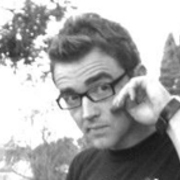
Greg Page
Palmerston North-born Greg Page personifies the concept of multi-tasking. Alongside having directed 90 plus music videos (including 'Verona' by Elemeno P and 'Exit To The City' by The D4) and at least as many TV commercials, he is also a painter and has done stints as a drummer in three bands.
Page was attending Waikato Polytechnic's media course when he started making music videos for local musicians, including one of the bands he was drumming in, Rumpus Room.
"I made some dodgy VHS clips for local Hamilton bands by going to parties and filming them playing and just cutting stuff together. Then I went, 'Hey shit, this is a really fun way to do film school'. Unfortunately it meant I failed film school, because in my third year I made something like ten music videos while trying to be a student!"
His 1994 short film claymation, Decaff ensured Page wouldn't be tempted back to finish the course. Based on an over-caffinated bad-tempered character who does "what you wish you could but never would", the four-minute short gained a cult audience and received Arts Council funding for general release. In 1997 Greg created Decaff II, a further five one-minute long claymation films based on the character.
The self-taught drummer's forays into animation attracted the attention of advertising agency Saatchi and Saatchi. In 1996 they commissioned Page and veteran filmmaker John O'Shea to each create a three minute short film, commemorating 100 years of New Zealand cinema. O'Shea, as a pioneer of New Zealand cinema, and Page, as one of the new generation, were considered representative of the past and future of Kiwi filmmaking.
Saatchi's then commissioned him to make a series of claymation commercials for NZ On Air. Page was also starting to build a reputation as one of New Zealand's most prolific music video directors (including promos for The D4, Stellar* and P-Money), and the first video for The Datsuns. Keen to capture the energy and excitement of a live band, Page is willing to try almost anything to get musicians out of their comfort zone — including filming bands in a moving van, an industrial freezer, a swimming pool, or dousing them in rain (Scribe and P-Money, Betchadupa video 'Sleepy News').
In 1997, Page signalled a move away from animation with the NZ Film Commission funded live action short, Sarah's Washing (which won a Merit Award at the Chicago Film Festival).
Inspired partly by fog-shrouded drives between Auckland and band practice in Hamilton, Page made his first feature film in 2003, supernatural horror The Locals. Page had told himself that if he hadn't directed a movie by the time he turned 30, he would go become a truck driver instead. He learnt that he had got funding three weeks before the fateful birthday.
The Locals centres around two young surfers (one played by musician and future Ferndale Strangler Johnny Barker) who get stranded on a rural backroad, and discover that rural Waikato is inhabited by more than cows and cabbage trees. The film was licensed for release in more than 60 territories. The soundtrack featured a host of bands from the Waikato, many of whom Page had made music videos for.
He has also directed a long run of television commercials for Flying Fish Productions, and is developing his second horror feature, The Vent. In December 2009 Page was sole recipient of the 2010 Film Commission Writer Award, after proposing "three fresh and contemporary NZ story ideas" from different genres.
Television series Bigger, Better, Faster Stronger (2011) saw Page appearing on screen; in the show he sets about remodelling household items to give them some edge, in competition with radio host James Coleman.
Sources include
Greg Page
Andrew Johnstone, 'Greg Page Profile' AudioCulture website. Loaded 1 June 2016. Accessed 15 May 2017